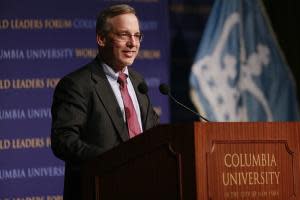 The Lookout
The LookoutFed responds to criticism of its asset purchases

In a rare step, the Federal Reserve has launched an aggressive response to criticism of its recent decision to buy Treasury bonds in an effort to jump-start the economy. The response is further evidence that the central bank's traditional independence from politics has begun to fade.
Harsh critics of the decision on asset purchases include former Fed Chairman Alan Greenspan, an alliance of conservative economists and writers, representatives of several foreign governments, and even Sarah Palin -- not generally seen as an authority on monetary policy. By and large, the critics argue that the Fed is deliberately weakening the dollar to increase the competitiveness of U.S. exports, that the asset purchases could lead to inflation down the road, and that the move is unlikely to succeed in spurring economic growth.
In response, William Dudley, the president of the Federal Reserve Bank of New York, gave an interview published in Tuesday's New York Times and denied that the goal was to push down the dollar or that inflation was a significant risk. And Dudley argued that the Fed's move -- which it began to signal in August -- is already having an effect.
"You've seen a significant easing of financial conditions" since August, Dudley said. "I have to believe that the expectation of a second large-scale asset purchase program was the primary driver of those changes."
Janet Yellen, the vice chairwoman of the Fed, delivered a similar message in an interview with the Wall Street Journal, arguing that the Fed had to step in to spur the economy. Without monetary stimulus, she said, "I'm having a hard time seeing where really robust growth can come from."
Over and above the specifics of the argument, the interviews by Dudley and Yellen appear to reflect new thinking by Fed brass: that the central bank can no longer afford to remain aloof from heated public debates over its policies. It has traditionally remained removed so as not to compromise its image of political independence. But during the economic turmoil of the last few years, the Fed has played a major role in the government's effort to prop up the financial sector, and then to spur economic growth. That, in turn, has opened it to criticism from both small-government conservatives and liberals distrustful of Wall Street. Fed officials apparently have concluded that they can no longer stand on the sidelines of the political debate without damaging their institution's authority.
Indeed, the Fed will be forced to continue weathering such challenges. Rep. Ron Paul (R-Texas) -- whose 2008 presidential bid was centered on his opposition to the very concept of monetary policy -- is in line next year to take over the congressional committee that oversees the Fed. Paul plans to use his post as a "mini bully pulpit," he has said.
(2009 photo of Dudley speaking at a forum: AP/Mary Altaffer)
